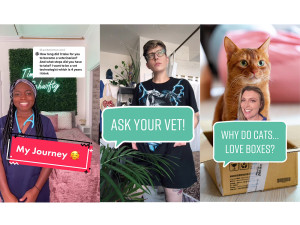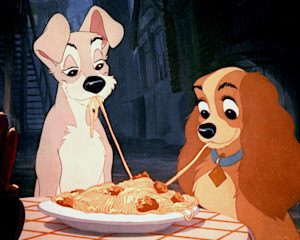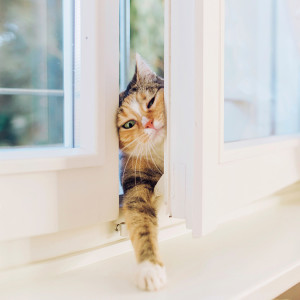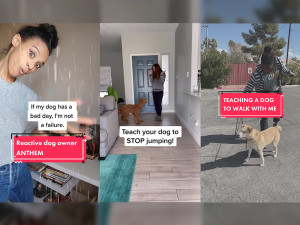
Share Article
I wasn’t sure what I was watching at first – this ‘cute’ video had found its way into my feed. Admittedly, there’s loads of dog content in my FYP, but something about this one hit different.
Cue a corgi minding his own business on the sofa, until suddenly his pet parent scoops him up and spins him around and around in circles. The Corgi doesn’t know what’s hit him – his eyes are wide, darting back and forth.

Get (totally free) deals for food, treats, accessories, tech and way more pet parenting must-haves.
In a TikTok with 5.6 million views, a Dachshund’s head lolls around as his eyeballs roll back so you see the whites. Another shows a pet parent, phone clamped in his mouth, approaching his Golden Retriever, bending down to pick her up; the view then switches to the phone in his mouth and an unflinching up-close view of the dog’s face, ears pinned back, as she’s whirled through the air.
This pet-spinning trend first took off in 2023 and the videos are all pretty much the same: with Taylor Swift’s ‘August’ or Passenger’s ‘Let Her Go’ playing in the background, pet parents spin their pets, phone in mouth as they capture their pet‘s reactions on screen. The videos feature mostly dogs and cats, but I’ve also spotted tortoises and even a racoon (who literally looks like they’re flying).
I haven’t linked to the videos but there’s thousands of easily-findable dog-spinning videos on social media. Each video draws in millions of viewers commenting things like: “awww, how cute” and “OMG he loves it”. These videos might seem like fun, but do pups really like being spun around for likes? Spoiler alert, probably not.
Is pet spinning causing harm?
Registered vet nurse, Jade The Vet Nurseopens in new tab called out the ‘trend’ on TikTok. “This is not a nice trend for your pets [...] it’s not pleasant for them,” she says, warning that not only can it make them dizzy and nauseous, but it can actually cause physical damage. “By picking your animals up under the front legs, you put pressure and strain on the shoulders, the elbows, the muscles and the ligaments,” she explains.
Jade stresses that when dogs – or any animal – squirm, it can cause “damage to their spine.” And “French Bulldogs and Dachshunds” are especially at risk.
What the experts say
Vet Dr Fabian Rivers, aka @dreadyvetopens in new tab, has concerns – “the main one being stress”. The dogs’ reactions are being misread by pet parents and online viewers as happiness and joy. “But they’re showing notable signs of stress including whale eyes, tracking [with their eyes] very quickly, licking lips, swallowing and ears pinned back,” he explains. Dr Rivers finds it concerning that pet parents are missing these visual cues, which in turn takes away their pet’s agency.
The RSPCAopens in new tab’s Scientific & Policy Manager for Companion Animals Ashleigh Brown is in agreement: “Behavioural signs of discomfort, fear, pain or stress aren’t always recognised by owners. Our pets’ distress can often go unnoticed – despite good intentions.”
Gripping a dog like this may also be uncomfortable or painful, continues Ashleigh – “particularly for heavier dogs; and being elevated from the ground and spun around may create fear of falling.”
“It can also easily go wrong,” warns Dr Rivers, “you could accidentally drop your dog or hit an object – in the most severe situations, it could risk dislocation.”
So why do people continue to jump on these trends?
Dr Rivers believes we humanise our pets as if they’re children – indeed, according to a surveyopens in new tab, over half of pet parents consider their pet as their child. “And social media amplifies our need to create moments that appear fun and happy,” he explains, and these “trends” draw attention to things that humans love. “Spinning a child is a carefree human event, however,” he caveats, “our dogs aren’t human.” To show our dogs love, we should treat them like a dog, not a human.
“Many interactions that may be fun or affectionate for humans can be unpleasant or aversive for dogs,” agrees Ashleigh, “even when done by familiar people.”
Expert behaviourist Louise Glazebrookopens in new tab, author of The Book Your Dog Wishes You Would Readopens in new tab warns that these trends even threaten to break your dog’s trust in you. “They make your dog wary of you – why would you actively choose to do that to the dog you love?” And Louise believes that a good relationship with your dog relies on trust.
The bigger picture
“TikTok trends generally aren’t made with the dog in mind, they’re created to get views,” Louise continues.
And these days, we’re all so immersed in our online worlds that we can become detached from our realities – and that of our pets. Ashley Frohnert, director of social media at animal-rights group PETA, says these videos show a disregard to animals, commenting that it treats them as if they’re a “dress-up doll or a TikTok propopens in new tab.” It’s easy to see how that can happen when that’s what our feeds are filled with. It’s advice your mum probably gave you, but you don’t have to do something just because everyone else is doing it.
In fact, the Social Media Animal Cruelty Coalitionopens in new tab was formed in 2020 to campaign against the damage social media is causing to the animal population. ‘Cute’ pet videos are part of the problem, causing pet parents to – intentionally or unintentionally – cross the line from ‘harmless’ fun to causing harm.
Showing our animals love should look like understanding who they are, reading their body language and respecting their boundaries – all things which, IMO, should garner more likes than making your dog scared. “We should view interactions with our pets from the animal’s perspective,” says Ashleigh, “social media trends should never take priority over the animal’s welfare.”
Vet Dr Katrina Warren called for an #antitrend, urging pet parents to share videos of their dogs relaxing in their beds, looking content in the knowledge that they won’t suddenly be yanked into the air. Be their safe space, not someone they want to run from.
And here’s the thing, our dogs can still be part of our families but “respectful parenting looks like seeing our family members for what they are,” concludes Dr Rivers, “and that goes for any being we’re supposed to be caregivers for.”

Alice Snape
Alice Snape is a freelance writer and editor whose work has featured in Cosmopolitan, Metro, Red, Vice, amongst other publications. Her rescue dog Lucy is the love of her life – probably because she’s an anxious weirdo like her. You’ll likely find them both curled up in bed – Alice’s favourite place to write from – or out having an adventure together in the park…
Related articles
Viral TikTok Trends Are Cute, But Does Your Pet Enjoy Them?
The real impact of social media trends on your pets’ well-being
![3 Screenshots side by side of cover photos for three different Veterinarians who post videos on Tik Tok.]()
11 Vets You Should Follow on TikTok
TikTok has a ton of veterinarians giving helpful (and entertaining) advice
![Lady And The Tramp spaghetti scene movie still]()
Not Lady, Not The Tramp: How Disney Did Dogs a Disservice
What Disney got wrong about your dog
![]()
Easy TikTok Pet Crafts To DIY Your Way To Your Pet’s Heart
Make your own toys, beds, snuffle mats and more and save yourself a bunch of money in the long run
![Tabby cat trying to open with her head window in order to enter the house.]()
Has a Cat Wandered Into Your Life? It Could Be the Cat Distribution System
TikTok thinks the universe just provides you a cat – is that really a thing?
![Side by side screenshots of Tik Toks by Tik Tok trainers. Left most image shows a woman with a surprised face with text that reads, "If my dog has a bad day, I'm not a failure," in white with, "Reactive Dog Owner ANTHEM," in pink. The center image is of a woman standing in her living room entry way which reads "Teach your dog to STOP jumping." The right most image depicts a Nigerian man training a tan dog that reads, "TEACHING A DOG TO WALK WITH ME."]()
11 Dog Trainers You Should Follow On TikTok
Get expert, entertaining dog training tips while you scroll





